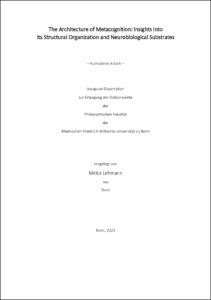Lehmann, Mirko: The Architecture of Metacognition: Insights into its Structural Organization and Neurobiological Substrates. - Bonn, 2023. - Dissertation, Rheinische Friedrich-Wilhelms-Universität Bonn.
Online-Ausgabe in bonndoc: https://nbn-resolving.org/urn:nbn:de:hbz:5-70361
Online-Ausgabe in bonndoc: https://nbn-resolving.org/urn:nbn:de:hbz:5-70361
@phdthesis{handle:20.500.11811/10734,
urn: https://nbn-resolving.org/urn:nbn:de:hbz:5-70361,
author = {{Mirko Lehmann}},
title = {The Architecture of Metacognition: Insights into its Structural Organization and Neurobiological Substrates},
school = {Rheinische Friedrich-Wilhelms-Universität Bonn},
year = 2023,
month = mar,
note = {Metacognition, the capacity to monitor one’s own mental states and processes, is integral to successful human behavior. However, key questions regarding the architecture of metacognition remain hitherto unresolved. For example, it is unclear whether the accuracy of metacognitive evaluations converges on a single, unitary resource across various tasks or whether there are separable metacognitive subsystems for different demands. This also poses a challenge to the investigation of the neurobiological processes underlying metacognitive operations, as insights into the structure of metacognition in one functional domain are thus not readily applicable to other domains. Furthermore, only little is known about how metacognition is underpinned at the level of neurotransmitter systems.
The research reported in this dissertation aimed to yield insights towards resolving these questions by investigating the architecture of metacognition in three original studies. Specifically, a large-scale behavioral study was conducted to analyze the pattern of individual differences in metacognitive ability across experimental domains and methodological approaches, in which several aspects were taken into account that are considered to be critical to the investigation of this research question. It was found that a combination of domain-general (unity) and domain-specific (diversity) components most adequately describes the structure of metacognition. Moreover, two separate functional magnetic resonance imaging (fMRI) studies are described which examined the effects of a specific pharmacological challenge on the integrity of metacognitive processes in two different domains, episodic memory and visual perception: The N-methyl-D-aspartate (NMDA) glutamate receptor antagonist ketamine represents a promising candidate for pharmacological modulations of metacognition, as previous studies obtained indications of ketamine-induced alterations in related functions. Convergent evidence of both studies indicates an involvement of the glutamatergic neurotransmitter system in metacognition, as the precision of meta-level evaluations was found to be attenuated during acute ketamine administration, which may partially be compensated by re-representations of maintained object-level information. Overall, the studies presented in this dissertation provide novel contributions to the scientific understanding of the architecture of metacognition.},
url = {https://hdl.handle.net/20.500.11811/10734}
}
urn: https://nbn-resolving.org/urn:nbn:de:hbz:5-70361,
author = {{Mirko Lehmann}},
title = {The Architecture of Metacognition: Insights into its Structural Organization and Neurobiological Substrates},
school = {Rheinische Friedrich-Wilhelms-Universität Bonn},
year = 2023,
month = mar,
note = {Metacognition, the capacity to monitor one’s own mental states and processes, is integral to successful human behavior. However, key questions regarding the architecture of metacognition remain hitherto unresolved. For example, it is unclear whether the accuracy of metacognitive evaluations converges on a single, unitary resource across various tasks or whether there are separable metacognitive subsystems for different demands. This also poses a challenge to the investigation of the neurobiological processes underlying metacognitive operations, as insights into the structure of metacognition in one functional domain are thus not readily applicable to other domains. Furthermore, only little is known about how metacognition is underpinned at the level of neurotransmitter systems.
The research reported in this dissertation aimed to yield insights towards resolving these questions by investigating the architecture of metacognition in three original studies. Specifically, a large-scale behavioral study was conducted to analyze the pattern of individual differences in metacognitive ability across experimental domains and methodological approaches, in which several aspects were taken into account that are considered to be critical to the investigation of this research question. It was found that a combination of domain-general (unity) and domain-specific (diversity) components most adequately describes the structure of metacognition. Moreover, two separate functional magnetic resonance imaging (fMRI) studies are described which examined the effects of a specific pharmacological challenge on the integrity of metacognitive processes in two different domains, episodic memory and visual perception: The N-methyl-D-aspartate (NMDA) glutamate receptor antagonist ketamine represents a promising candidate for pharmacological modulations of metacognition, as previous studies obtained indications of ketamine-induced alterations in related functions. Convergent evidence of both studies indicates an involvement of the glutamatergic neurotransmitter system in metacognition, as the precision of meta-level evaluations was found to be attenuated during acute ketamine administration, which may partially be compensated by re-representations of maintained object-level information. Overall, the studies presented in this dissertation provide novel contributions to the scientific understanding of the architecture of metacognition.},
url = {https://hdl.handle.net/20.500.11811/10734}
}






